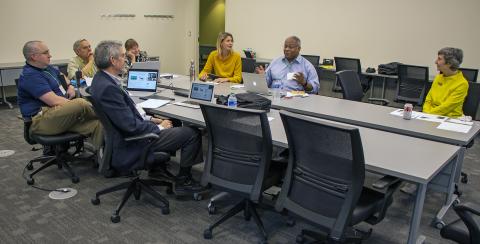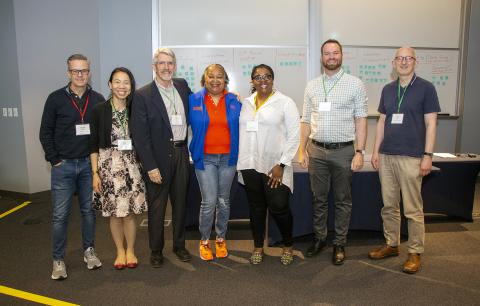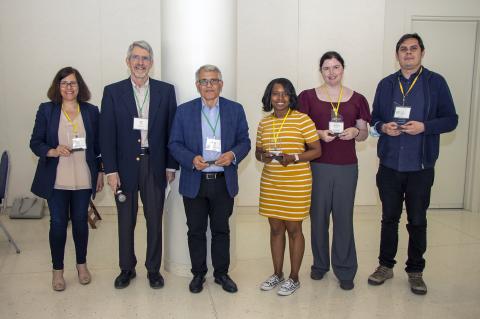Georgia Tech hosted the annual Vertically Integrated Projects (VIP) Consortium Meeting on May 26-27 at the Georgia Tech Hotel and Conference Center. The VIP Consortium is a nonprofit alliance established to support and promote the success of VIPs in colleges and universities worldwide.
VIP is an award-winning educational construct developed at Georgia Tech and Purdue University and refined for over 25 years. In a VIP, teams of undergraduate students collaborate with faculty and their graduate students on ambitious, long-term projects of mutual interest.
In 2014 Georgia Tech led the establishment of the VIP Consortium to support peer-learning and dissemination of the VIP model. The annual conference allows attendees to share updates, best practices, and discuss how to overcome the challenges of running a VIP program. The Consortium now includes 44 institutions in 13 countries around the world.
“We have a wide variety of institutions from all over the world participating in VIP, and each school has its own approach given its specific context, but schools might want to adapt their approaches based on what they hear others are doing,” said Leah Misemer, VIP assistant director. “The sharing done at the Consortium meeting helps people tap into the vast resource that is the VIP community.”
The 2022 Consortium meeting was the first held in person since 2019 due to the COVID-19 pandemic. More than 80 individuals from 39 U.S. and international institutions attended this year’s event. VIP programs from across the state of Geogria were present, including representatives from Georgia College, Georgia State University, Georgia Southern University, Savannah State University, and the University of Georgia.
Domestically, VIP programs from Purdue University, Boise State University, Stony Brook University, Tougaloo College, Virginia Commonwealth University, and the University of Memphis gave site updates.
International site updates were presented by Inha University (S. Korea), Riga Technical University (Latvia), University of St. Andrews (Scotland), University of Strathclyde (Scotland), Universidad de Chile (Chile), and Universidad Icesi (Columbia).
Additionally, a MEPI (US-Middle Eastern Partnership Initiative) grant allowed for representatives from Lebanese American University and American University in Beirut to attend and give site updates.
This year, several prospective institutions were in attendance, who had their own half day workshop on Wednesday prior to the conference on how to establish and scale a VIP program.
The two-day meeting included multiple breakout sessions and panels on topics such as strategies for promoting diversity within VIP, building community within and among VIP programs through social media, multi-institution VIP teams, and connecting the work of VIP teams to the United Nations Sustainable Development Goals (UNSDGs).
Throughout the week, participants heard from Steve McLaughlin, provost and executive vice president for academic affairs at Georgia Tech, Ed Coyle, VIP co-founder and professor at the Georgia Tech School for Electrical and Computer Engineering (ECE), and Chaouki Abdallah, executive vice president for research at Georgia Tech. McLaughlin highlighted the VIP program as “transforming higher education” and applauded its commitment to students, and Abdallah praised VIP for supporting “research that matters.”
Throughout the week, participants heard from Steve McLaughlin, provost and executive vice president for academic affairs at Georgia Tech, Chaouki Abdallah, executive vice president for research at Georgia Tech, and Ed Coyle, VIP co-founder and professor at the Georgia Tech School for Electrical and Computer Engineering (ECE). McLaughlin highlighted the VIP program as “transforming higher education” and applauded its commitment to students, and Abdallah praised VIP for supporting “research that matters.”
A key aspect of this year’s meeting was a discussion that included the directors of VIP sites and the nonprofit VIP Consortium, Inc.’s board of directors. Executive director Dr. Mark Randolph described the consortium and its role in serving all VIP sites. This included the short-term goal of creating an online repository of documents and processes that are useful to all sites, and the longer-term goal of raising resources to address the needs of all VIP sites. The latter goal was addressed in a special session on fundraising from Ann Cramer of Coxe Curry & Associates.
Additional Images



